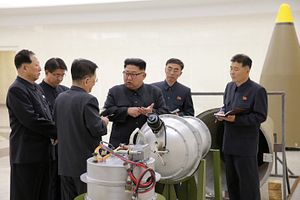War between the United States and North Korea has begun to seem like a real possibility. Within hours of the Sunday, September 3 test of what Pyongyang claimed was a thermonuclear weapon, President Donald Trump tweeted that the North Koreans “only understand one thing.” The next day, his ambassador to the United Nations, Nikki Haley, claimed that North Korea’s leader, Kim Jong-un, was “begging for war.” Then on Thursday, Trump described military action – using “new and beautiful equipment, the best in the world” – as “something certainly that could happen.”
The Trump administration seems to be considering military action because it appears to recognize that there is now little chance of denuclearizing North Korea and is concerned that “North Korea might not be able to be deterred.” But it is focused on the wrong question. The right question is not whether North Korea can be deterred, but rather how the risks of trying to do so compare to the risks of the alternative – a preventative war. When these risks are weighed up, deterrence turns out to be the less dangerous option.
Military action would run the risk of nuclear strikes against U.S. bases in South Korea, Japan, and Guam, as well as American cities. The U.S. intelligence community has reportedly assessed that North Korea is now capable of fitting a nuclear warhead onto a ballistic missile. Launching military action in the hope that Kim did not yet have a functioning nuclear arsenal would be insanity.
It would be almost as Pollyannaish to hope that Kim would not use nuclear weapons in response to military action. Even if such action were as limited as possible and focused solely on disarming him, it still would be a major operation, entailing numerous strikes across the country. From Kim’s perspective, it would probably look like the beginning of an attempt at regime change. Confronted with the apparent likelihood of ending up like Saddam Hussein or Muammar el-Qaddafi, a desperate roll of the nuclear dice would not be irrational.
The United States’ best strategy for preventing a nuclear response would be to try to hunt and destroy North Korea’s nuclear-armed missiles, all of which are mobile, before they were used. Yet Vice Chairman of the U.S. Joints Chief of Staff Gen. Paul Selva has admitted that he is not confident in the United States’ ability to monitor deployments of North Korean missiles, giving little hope that such an operation would be successful. Meanwhile, given the mixed test record of U.S. missile defenses – especially the system designed to protect the continental United States – it would be foolhardy to rely on them to intercept those missiles that the United States could not destroy on the ground.
So, what about deterring North Korea?
The most detailed argument for why North Korea might not be deterrable came from U.S. National Security Adviser Lt. Gen. H. R. McMaster, who pointed to the regime’s “brutality” to its own people and to the scale of the threat it poses. Yet exactly the same criticisms were justly leveled against the Soviet Union. Indeed, the recent assassination of Kim’s brother with the nerve agent VX in Kuala Lumpur – which McMaster cited as evidence for the regime’s brutality – was distinctly similar to the 1978 murder of the Bulgarian dissident Georgi Markov with a ricin-tipped umbrella in London. Ultimately, the possibility that a major war would threaten the survival of Soviet leaders was enough – at least after 1962 and the Cuban Missile Crisis – to stop the them from initiating a course of action that might lead to one.
Similarly, Kim may be evil and provocative, but he is not irrational. His actions since assuming North Korea’s leadership appear carefully designed to further his own interests. Launching nuclear weapons would invite his own destruction and so almost certainly be judged as unacceptably risky – unless he believed his regime was in mortal peril already.
While trying to deter North Korea is the better choice, it would certainly not be free from risk. The challenge now is how to reduce these risks as much as possible – raising a whole series of genuinely difficult questions. The purpose of sanctions is to lift them if the other side complies with your demands. But, if denuclearization is no longer a viable short-term aim, what kind of behavior change should the international community seek from Pyongyang? How should regional military exercises involving the United States and its allies be conducted to reduce the chance of sparking a crisis that might lead to war? Should the United States be prepared to conduct talks with North Korea (most likely in secret) on “redlines” and crisis management? Are there any concrete risk-reduction measures that would make sense? U.S. policymakers would be much better served by focusing on these questions rather than the potentially suicidal fantasy of a perfect war.
James M. Acton is co-director of the Nuclear Policy Program and a senior fellow at the Carnegie Endowment for International Peace.

































